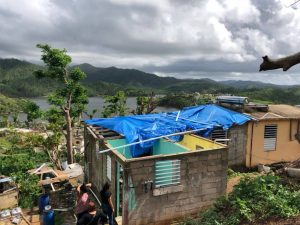16 Days of Activism against Gender-Based Violence: Day 7
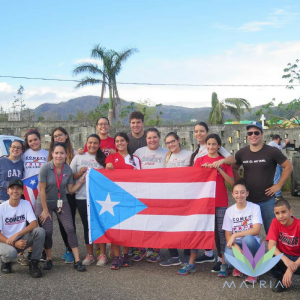 If we understand peace as a state in which human security is guaranteed for all people, Puerto Rico today lacks peace and is a dangerous, hostile, and violent territory for its inhabitants, and particularly for women. When Hurricane Maria hit the Caribbean country in September, it revealed how the country’s colonial, economic and social situation had kept the majority of its population in poverty and how that humanitarian crisis had been consistently ignored by the governments of Puerto Rico and the United States of America. Poverty, public debt and government corruption created structural and social vulnerability that made it impossible for Puerto Rico to withstand, and afterwards recover from, the winds and rains of the hurricane.
If we understand peace as a state in which human security is guaranteed for all people, Puerto Rico today lacks peace and is a dangerous, hostile, and violent territory for its inhabitants, and particularly for women. When Hurricane Maria hit the Caribbean country in September, it revealed how the country’s colonial, economic and social situation had kept the majority of its population in poverty and how that humanitarian crisis had been consistently ignored by the governments of Puerto Rico and the United States of America. Poverty, public debt and government corruption created structural and social vulnerability that made it impossible for Puerto Rico to withstand, and afterwards recover from, the winds and rains of the hurricane.
More than seventy days after the passage of Hurricane Maria, much of the population lacks electricity, drinking water, telephone system and access to basic services of education, health and food. The nation’s public schools remain closed, while hospitals in Puerto Rican continue to operate with generators, putting their services at risk due to the potential collapse of energy. To this day, the government has been unable to provide an official count of the actual number of hurricane-related deaths. Thousands of families who lost their homes are still waiting for aid that will allow them to find safe shelter or recover the loss of belongings. After the hurricane, more than one hundred thousand and fifty Puerto Ricans to date have migrated to the United States mainland.
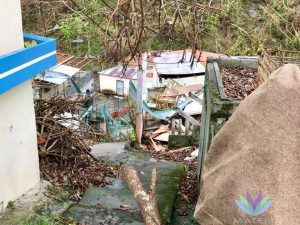 The response of the governments of Puerto Rico and the United States has been late, weak and disorganized. United Nations experts reported even before the hurricane that Puerto Rico suffered a human rights crisis that has been consistently neglected by the United States despite the island’s status as a U.S. colony for more than a hundred years. President Trump has exhibited his attitude of discrimination against this Caribbean island in his statements and his recent visit. Communities across Puerto Rico, and particularly in rural areas, report that they have been ignored in the immediate aid plans and fear being left out of the recovery plans.
The response of the governments of Puerto Rico and the United States has been late, weak and disorganized. United Nations experts reported even before the hurricane that Puerto Rico suffered a human rights crisis that has been consistently neglected by the United States despite the island’s status as a U.S. colony for more than a hundred years. President Trump has exhibited his attitude of discrimination against this Caribbean island in his statements and his recent visit. Communities across Puerto Rico, and particularly in rural areas, report that they have been ignored in the immediate aid plans and fear being left out of the recovery plans.
Puerto Rico’s crisis has only been alleviated by the efforts of community-based civil society organizations, which have channeled aid and services to areas that have been abandoned by government agencies.
For women, the outlook is particularly devastating. Before Hurricane Maria, about 60% of women-led families were living below the poverty level. Official statistics on gender-based violence reported only a fraction of the incidents that occurred in Puerto Rico, and even so they registered some 12,000 complaints a year. Service organizations such as emergency shelters for women in domestic violence situations already operated in a constant state of economic precariousness. Since Hurricane Maria that situation has been exacerbated not only by the women’s material losses, but because aid and disaster response programs ignore the issue of gender inequality and have omitted the prevention and intervention plans to deal with gender-based violence that should have been activated after the hurricane wiped out the little social infrastructure that existed to deal with the problem.
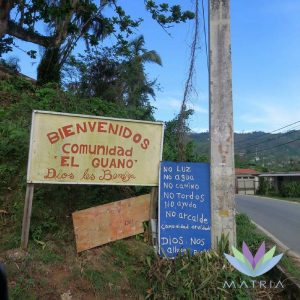 The current silence regarding domestic violence and violence against women, due in large part to the fact that the government has not given priority to the issue and that the media considers it a secondary theme, increases women’s vulnerability and at the same time, generates a sense of impunity in aggressors that grows with the awareness that the justice system is operating at limited capacity. Puerto Rico police offices have rejected reports of domestic violence on the grounds that they are not a priority. There are also fears that the hospital protocols for cases of sexual assault and domestic violence are not being implemented. No government agency has seen the need to restore a coordinated response to violence against women.
The current silence regarding domestic violence and violence against women, due in large part to the fact that the government has not given priority to the issue and that the media considers it a secondary theme, increases women’s vulnerability and at the same time, generates a sense of impunity in aggressors that grows with the awareness that the justice system is operating at limited capacity. Puerto Rico police offices have rejected reports of domestic violence on the grounds that they are not a priority. There are also fears that the hospital protocols for cases of sexual assault and domestic violence are not being implemented. No government agency has seen the need to restore a coordinated response to violence against women.
Again, it has been women’s organizations that have taken on the responsibility of working to meet the needs of women in Puerto Rico and their communities. Since the hurricane, many of those organizations dedicated themselves to receiving and channeling support, and to developing participatory and transparent recovery plans with a central a gender perspective. Women have raised funds to rehabilitate domestic violence shelters and provide generators to restore services. They have also taken food, medicines and baby supplies to towns throughout the country. Others have formed part of the work in alliances to relocate housing or safe places for women heads of families who lost their homes.
Women peace-builders must be an integral part of the entire process to ensure human security and peace in countries experiencing disaster situations. The women of Puerto Rico are already doing their part. We are convinced that now is the time to stand in solidarity with them and join our voices in an international call to demand that violence against Puerto Rican women be treated as a priority in the aftermath of the natural disaster and that women be given leadership roles as decision-makers in reconstruction plans.
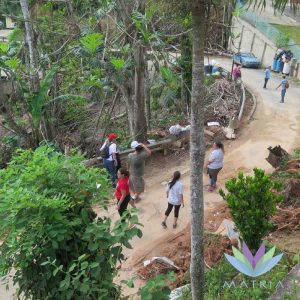 The women of the world have the right to live in peace, and the women of Puerto Rico will not have peace as long as their basic human rights are not addressed, the justice system ignores their complaints, and the government does not take responsibility to prevent violence against them and prioritize their needs. We appeal to other women, but particularly to women in the United States, to demand that their governments act to provide immediate assistance and recovery measures that actively promote the human rights, short and long-term needs and critical role of Puerto Rican women.
The women of the world have the right to live in peace, and the women of Puerto Rico will not have peace as long as their basic human rights are not addressed, the justice system ignores their complaints, and the government does not take responsibility to prevent violence against them and prioritize their needs. We appeal to other women, but particularly to women in the United States, to demand that their governments act to provide immediate assistance and recovery measures that actively promote the human rights, short and long-term needs and critical role of Puerto Rican women.
We refuse to rebuild the weak and unjust structures we had before, and instead commit ourselves to rebuilding a more just and equal society, with real protections against the acts of violence and the violence of poverty that so many Puerto Rican women suffered. We call on women around the world to support us in this historic endeavor.
* Letter written in the framework of the Strategic Dialogue on Women, Human Security and Sustainable Peace in the Americas, with the participation of leaders of women’s organizations from ten countries. Antigua, Guatemala. Oct. 31-Nov.2
TAKE ACTION!
You can contribute to Proyecto Matria’s recovery work. Please visit: https://www.generosity.com/emergencies-fundraising/puerto-rico-hurricane-relief-fund-proyecto-matria
